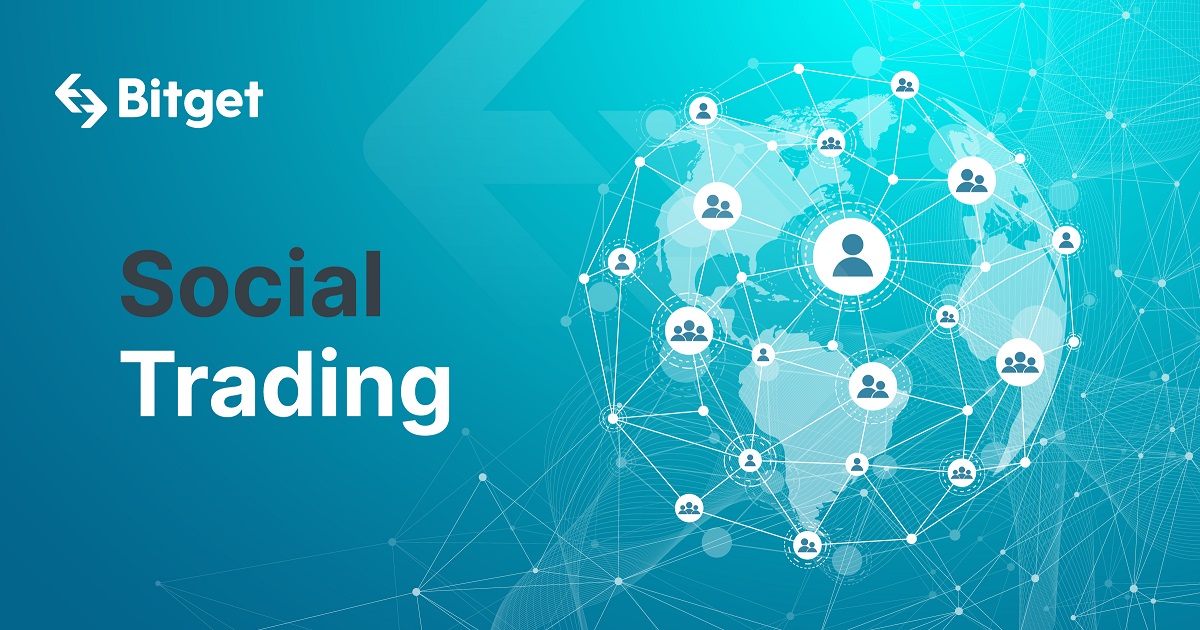General News
Bitget Aims to Transform the Way People Connect and Trade with Social Trading

Bitget, the world’s leading social trading and copy trading platform, has always placed product innovation at the core of its focus.

As social media and messenger platforms become an integral part of people’s lives, be it professional or personal, there is no reason why crypto investment should not be incorporated.
Social trading allows people to interact and observe other traders, as well as follow or execute the strategies of more experienced peers. Social trading also maximises one’s own trading potential with a little help from someone more experienced.
That said, a platform cannot realise social trading in its entirety until product innovation becomes the guiding principle of its design and development, and until it has many users to attest to the transformative power of social connection.
Founded in 2018, Bitget, the world’s leading social trading and copy trading platform, provides services to more than 2 million users in 50 countries worldwide.
The average daily trading volume of Bitget has reached $7 billion, consequently ranking the platform fifth globally.
At present, Bitget has developed into one of the largest social tradings and copy trading platforms in the world.
Listed by CoinMarketCap as the leading crypto derivatives trading platform, Bitget is valued at more than $3 billion.
Product innovation is a guiding principle at Bitget, proven most meaningfully through its flagship product, One-Click Copy Trade.
Since its launch in May 2020, One-Click Copy Trade has broken the mould of trading patterns in the crypto market, bridging the gap between traders from all corners of the world, in addition to elite traders and their fans.
Thus, a social trading pattern has been forged into Bitget’s core, where followers and traders can interact without boundaries and carve their own interconnected path to financial freedom.
To date, Bitget’s One-Click Copy Trade has amassed over 27,000 professional traders, with approximately one million followers. Moreover, copy-traders on the platform have earned over $1 billion in total income, while followers have collectively made over $1.56 billion.
Adhering closely to the concept of social trading, Bitget will work towards an open strategy platform in 2022. The first step is to launch grid trading, a type of quantitative trading strategy designed to maximise returns in a range-bound market.
A user simply sets a price range for the automated trading bot, adjusts how many grids they want, and, as long as the price stays within one’s set range and depending on the setup, the bot will sell a portion when the price goes up or buy a portion when it goes incrementally down.
Commenting on the latest development of social trading, Managing Director of Bitget, Gracy Chen said, “From social media to social messenger to social trading, crypto is finally connecting to the social.
“The model taps into our innate need for connection, whether that means sharing, celebrating, or even commiserating in the company of others while we trade.
“Here at Bitget, our flagship offering, One-Click Copy Trade, is nothing short of a pioneer in social trading. Moreover, copy trading and grid trading light a path to the full potential of social trading, enabling users, KOLs, and professional traders to exchange information freely, adopt multiple trading patterns and optimise strategies for their own benefit, and in the long run, further strengthening the foundation of the Bitget ecosystem.”
Chen continued to add, “Looking ahead, Bitget’s open strategy platform will launch more products that fit the model of social trading in due course. We look forward to our users experiencing the fun and transformative potential of social trading on Bitget.”
General News
Nigeria First Policy: FG Reaffirms Galaxy Backbone as ICT Provider

Federal government , through the Office of the Secretary to the Government of the Federation (OSGF), has issued a circular reaffirming its commitment to leveraging the substantial investment in the National Information Communications Technology Infrastructure Backbone (NICTIB), for the benefit of Ministries, Departments and Agencies (MDAs).

Chidi Okpala, spokesperson for Galaxy Backbone Ltd, disclosed this in a statement on Monday.
The directive, issued in line with the Nigeria First Policy, endorsed Galaxy Backbone Limited, as the designated provider of ICT infrastructure for federal government institutions.
Commenting, Professor Ibrahim Adeyanju, managing director, Galaxy Backbone Ltd, reiterated that the agency is well positioned to actualise the Nigeria First Policy in the country’s ICT sector.
“We have repositioned our organisation in such a way that the MDAs experience the quality, reliability, and innovation of our services, and they can see us as a partner in their digital transformation journey.
“Our pledge is to listen, collaborate, and provide tailored digital infrastructure solutions that meet the unique needs of each agency, while ensuring Nigeria’s data remains safe within our borders,” he said.
According to him, federal government MDAs are expected to accelerate Nigeria’s digital transformation and contribute directly to national economic growth through the implementation of the Nigeria First Policy.
Galaxy Backbone Ltd was established by the Federal Government with the core mandate of ensuring data sovereignty through a centralised e-government platform that offers secure connectivity and related ICT services.
General News
FG Reaffirms Galaxy Backbone as Its ICT Infrastructure Provider Under Nigeria First Policy

The Federal Government, through the Office of the Secretary to the Government of the Federation (OSGF), has issued a circular reinforcing its commitment to leveraging the substantial investment in the National Information Communications Technology Infrastructure Backbone (NICTIB) for the benefit of Ministries, Departments, and Agencies (MDAs).

This directive, in line with the Nigeria First Policy, endorses the use of Galaxy Backbone Limited (GBB) as the designated provider of ICT infrastructure for Federal Government Institutions, covering IP-network services, data centre hosting, and related infrastructure solutions.
GBB was established by the Federal Government with the core responsibility of ensuring data sovereignty through a centralized e-government platform that offers secure connectivity and related ICT services. Over the years, the organization has consistently invested in upgrading its capacity, achieving multiple international certifications and recertifications that position it as a provider of world-class, secure, and reliable technology services.
With this renewed endorsement, GBB is also officially positioned as the Government Data Exchange Platform and the interoperability layer for the nation’s Digital Public Infrastructure implementation, reinforcing its role as the body that coordinates, manages, and integrates all federal digital infrastructure and services, ensuring they comply with Nigeria’s data sovereignty goals and work harmoniously as part of the nation’s digital public Infrastructure.
While this directive ensures compliance with the Nigeria First Policy, GBB emphasizes that its mission is to deliver excellence through building trust and collaboration with Ministries, Departments and Agencies (MDA). Federal Government Institutions currently hosting data abroad are encouraged to migrate to GBB’s secure platforms, confident in the assurance of improved service delivery, enhanced security, and alignment with global best practices.
“We have repositioned our organisation in such a way that the MDAs experience the quality, reliability, and innovation of our services and they can see in us as a partner in their digital transformation journey,” said Professor Ibrahim Adeyanju, Managing Director/CEO, GBB.
He further reiterated; “Our pledge is to listen, collaborate, and provide tailored digital infrastructure solutions that meet the unique needs of each agency, while ensuring Nigeria’s data remains safe within our borders.”
GBB’s commitment is rooted in service excellence, security, and innovation; principles backed by its ISO certifications and global standard operating frameworks. This renewed collaboration between GBB and MDAs is expected to accelerate Nigeria’s digital transformation and contribute directly to national economic growth.
General News
Virtual Reality in Healthcare: Nigeria’s Untapped Opportunity for Training, Patient Care, and Medical Innovation

Across the world, Virtual Reality (VR) is proving to be far more than a gaming technology. In healthcare, it is emerging as a practical solution to train professionals, improve patient care, and speed up medical innovation. For Nigeria — where health facilities face workforce shortages, infrastructure gaps, and tight budgets — VR offers a unique chance to leapfrog into modern practices without the prohibitive cost of traditional methods.

Training Without Risk, Learning Without Limits
One of the biggest hurdles in healthcare is preparing professionals for real-life emergencies. Nursing students can read about procedures in textbooks, but they need hands-on experience to master them. VR bridges this gap by simulating real hospital scenarios: inserting an IV line, performing CPR, or managing a trauma patient — all in a safe, repeatable virtual environment.
Emergency response teams can also rehearse disaster situations, from mass-casualty events to fire outbreaks, without risking lives or resources. Instead of waiting for rare live drills, responders can practice repeatedly in lifelike VR settings until every step becomes second nature.
Across Nigeria, a new wave of innovators, like Insightful3d Studio, is developing these immersive training programs locally. By building high-quality VR modules tailored for Nigerian hospitals, universities, and teaching centers, they reduce dependence on expensive foreign programs and make advanced training more affordable.
Improving Patient Understanding and Confidence
VR isn’t just for training staff. Patients can also benefit. For example, a woman preparing for childbirth can take a guided virtual tour of a delivery room to reduce anxiety. A family deciding on surgery can visualize what the procedure involves and better understand the risks and benefits. When people clearly see what to expect, trust in medical care increases — and so do positive outcomes.
A Platform for Local Innovation
VR also allows medical teams in Lagos or Abuja to collaborate seamlessly with specialists abroad. They can jointly review virtual models of medical cases, discuss treatment options, and learn new techniques in real time. For research institutions and pharmaceutical companies, VR provides an interactive environment to test ideas faster and with fewer physical resources.
Nigeria’s Window of Opportunity
Globally, VR in healthcare is growing rapidly — projected to become a multi-billion-dollar industry this decade. Nigeria does not need to be a latecomer. With forward-thinking hospitals, training schools, and government support, the country can develop home-grown solutions instead of importing them at high cost.
Companies like Insightful3d Studio are proving that this is not futuristic wishful thinking — it is already happening. The real question is not whether VR belongs in Nigerian healthcare, but how quickly hospitals, regulators, and investors will adopt it. Early movers will improve patient outcomes, cut training costs, and set a new standard for African healthcare.

 Telecom1 day ago
Telecom1 day agoNCC Launches Nationwide Campaign to Defend Nigeria’s Digital Lifelines

 General News1 day ago
General News1 day agoNCC Moves to Protect Consumers, Enforce Accountability in Telecoms

 News1 day ago
News1 day agoCAC Delists 247 Firms Over Invalid Registration Claims

 General News1 day ago
General News1 day agoSamsung Launches the Sleek and Durable Galaxy A07 in Nigeria

 Telecom1 day ago
Telecom1 day agoGufwan Commends NCC for Sensitisation Workshop on Digital Citizenship for Persons with Disabilities

 General News1 day ago
General News1 day agoNGF Plans Investopedia to Showcase Investments in 36 States

 Telecom12 hours ago
Telecom12 hours agoNCC Claims to Have Eliminated Unregistered SIMs from Telecoms Networks

 General News12 hours ago
General News12 hours agoVirtual Reality in Healthcare: Nigeria’s Untapped Opportunity for Training, Patient Care, and Medical Innovation

























